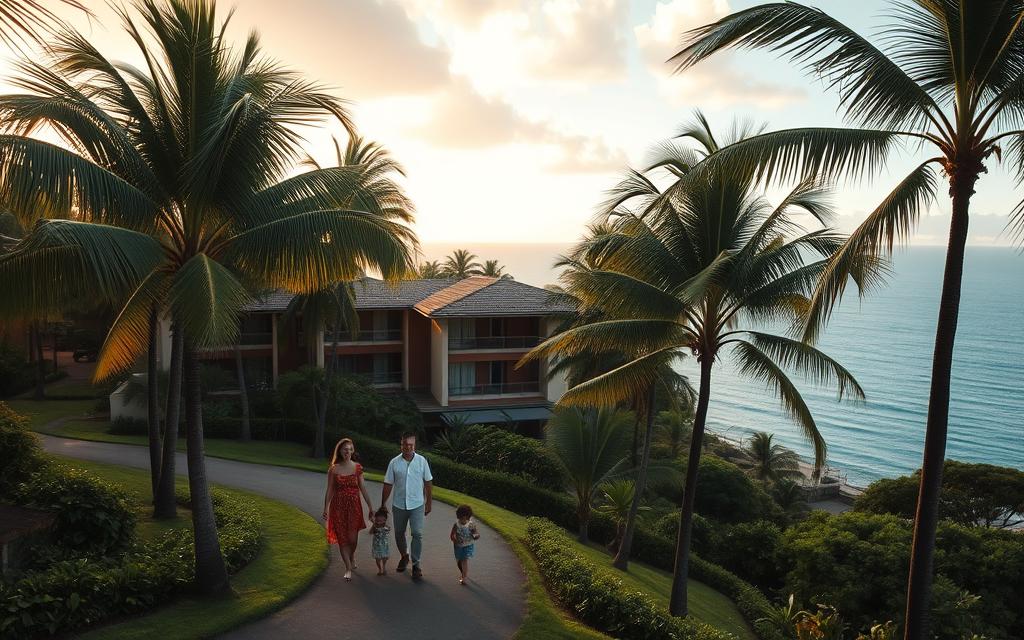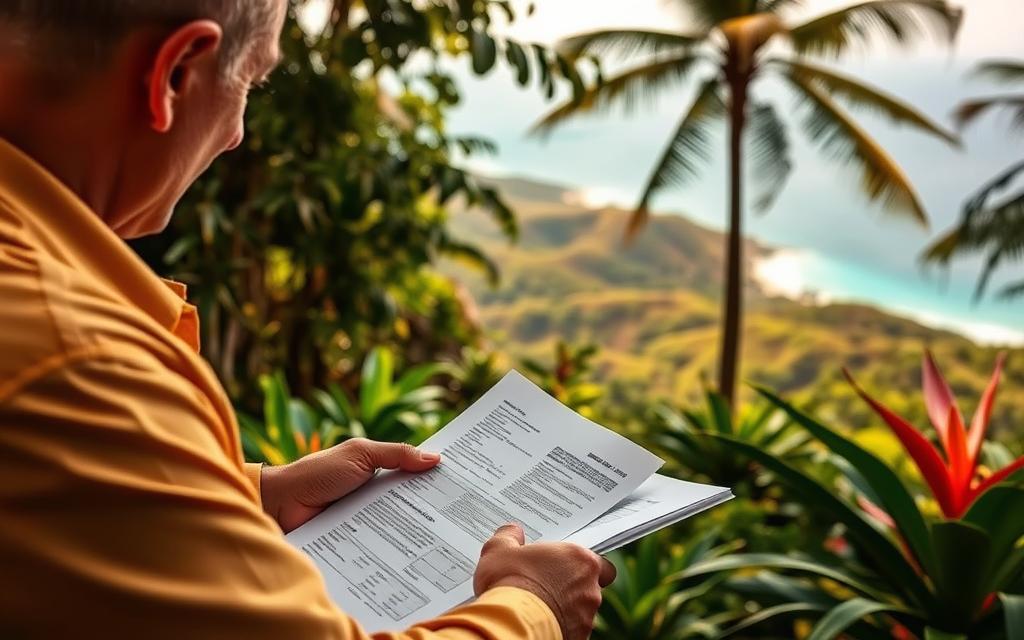How to Get Costa Rica Residency for Dependents | JAROS C.R.

Did you know that Costa Rica ranks as one of the top destinations for expats worldwide? According to Forbes (2023), this Central American gem is celebrated for its "Pura Vida" lifestyle, offering a unique blend of natural beauty, political stability, and warm hospitality.
For individuals and families seeking a fresh start, this country provides an ideal environment. With its lush rainforests, pristine beaches, and year-round tropical climate, it’s no wonder many choose to call it home. The process of securing residency here is straightforward, especially for dependents like spouses and children.
Our guide simplifies the steps, ensuring you have the right information to navigate the application process. Whether you’re considering the Rentista, Investor, or Pensionado categories, we’ll help you understand the requirements and benefits. From accessible healthcare to a welcoming community, Costa Rica offers countless opportunities for a better quality of life.
Overview of Costa Rica as a Prime Residency Destination
Known for its lush landscapes and friendly locals, Costa Rica is a top choice for expats. This Central American gem offers a unique blend of natural beauty, cultural richness, and a welcoming environment. Whether you’re seeking a peaceful retreat or an active lifestyle, this country has something for everyone.
Natural Beauty and Mild Climate
Costa Rica is home to breathtaking rainforests, pristine beaches, and diverse wildlife. Its mild tropical climate ensures comfortable living year-round. This makes it an ideal destination for those who love outdoor activities or simply want to enjoy nature’s tranquility.
Cultural Richness and Welcoming Environment
The warmth of Costa Rican culture is unmatched. Locals are known for their hospitality and the famous "Pura Vida" lifestyle, which emphasizes happiness and simplicity. This cultural richness creates a supportive community for newcomers.
According to recent surveys, Costa Rica consistently ranks as one of the happiest countries globally. Its high literacy rate and quality healthcare system further enhance its appeal. For those considering a move, this country offers both natural and social benefits that make it a prime residency destination.
Explore more about the residency process in Costa Rica to start your journey today.
Understanding Costa Rica Residency Options
Costa Rica provides a variety of residency options tailored to different lifestyles and financial situations. Whether you’re a retiree, investor, or someone with a stable income, there’s a pathway for you. Understanding these categories helps applicants make informed decisions.
Rentista, Investor, and Pensionado Categories
The Rentista category is ideal for individuals with a steady income. Applicants must show proof of $2,500 monthly for two years. This ensures financial stability during their stay.
For retirees, the Pensionado option requires a minimum monthly pension of $1,000. This category is popular among those seeking a relaxed lifestyle in a tropical setting.
The Investor category appeals to those willing to invest in the country. A minimum of $200,000 in property or business is required. This option supports local development while offering residency benefits.
Temporary vs. Permanent Residency Explained
Most applicants start with temporary residency, which lasts for three years. During this time, they must meet specific requirements, such as income or investment thresholds.
After three years, individuals can apply for permanent residency. This status offers long-term benefits, including access to healthcare and the ability to work without a permit.
Understanding the differences between temporary and permanent residency helps applicants plan their journey effectively. For more details, explore the legal requirements for residency in Costa.
How to get Costa Rica residency for dependents

Costa Rica’s immigration laws provide clear guidelines for including family members in residency applications. This ensures that spouses and children can join the primary applicant seamlessly. Understanding the eligibility criteria and required documents is essential for a smooth process.
Eligibility Criteria for Dependents
Under Costa Rican law, dependents include legally married spouses and minor children. Common-law partnerships are not recognized for residency purposes. Additionally, children aged 18 to 25 may qualify if they are full-time students or have disabilities.
Each dependent must meet specific requirements, such as providing a valid birth certificate or marriage certificate. These documents must be certified and translated if not in Spanish. Ensuring all paperwork is accurate and complete is crucial for approval.
Supported Applicants: Spouses and Children
Spouses applying as dependents must present a certified marriage certificate. This document proves the legal union between the primary applicant and their spouse. For children, a birth certificate is required to establish the parent-child relationship.
For children over 18, additional proof, such as enrollment in an educational institution or medical documentation, may be necessary. Meeting these criteria ensures that the entire family can enjoy the benefits of living in this beautiful country.
Preparing Your Application Package

Preparing a complete and accurate application package is crucial for securing residency in Costa Rica. This step ensures that all requirements are met and minimizes delays in the approval process. We’ll guide you through the essential documents, their validity, and the steps needed to legalize and translate them.
Vital Documents and Their Validity
Several key documents are required for a successful application. These include a valid passport, birth certificate, and marriage certificate if applicable. Each document must be recently issued or fall within the specified validity period.
For example, background checks and certificates typically need to be issued within the last six months. Ensuring these documents are up-to-date is critical to avoid rejection. We recommend double-checking the validity of each item before submission.
Document Legalization and Translation Requirements
All documents must be legalized or apostilled in their country of origin. This process verifies their authenticity and ensures they meet Costa Rican immigration standards. Additionally, any document not in Spanish must be translated by an authorized translator.
Common pitfalls include incomplete legalization or inaccurate translations. To avoid these issues, work with professionals familiar with Costa Rican immigration law. Properly prepared documents streamline the application process and increase your chances of approval.
Organizing your application package is equally important. Keep all documents in a secure folder and verify their completeness before submission. For more details on the Costa Rica dual citizenship requirements, visit our comprehensive guide.
Navigating the Application Process Step-by-Step

Applying for residency in Costa Rica involves a structured process that demands attention to detail. We outline a clear, step-by-step guide to help you file a complete and accurate application. Submitting incomplete documents can lead to delays, so it’s crucial to prepare thoroughly.
Filing Complete Applications
The first step is gathering all required documents. These include a valid passport, birth certificate, and marriage certificate if applicable. Each document must be recently issued or fall within the specified validity period. For example, background checks should be no older than six months.
All documents must be legalized or apostilled in their country of origin. Additionally, any document not in Spanish must be translated by an authorized translator. Properly prepared documents streamline the application process and increase your chances of approval.
Once your documents are ready, submit them to the Costa Rican immigration authority. The standard filing window is 90 days, but processing times often extend to 9-12 months. During this period, the immigration authority reviews your application for completeness and accuracy.
We recommend scheduling consultations with immigration experts for complex cases. Professionals can provide clarity on specific requirements and ensure your application meets all criteria. Proper preparation minimizes delays and enhances your chances of success.
Detailed Guide on Rentista Residency and Alternatives
Exploring residency options in Costa Rica reveals a variety of pathways tailored to different financial situations. The Rentista category is particularly popular among individuals with a stable income. This option requires proof of a monthly income of $2,500 or a corresponding bank deposit for two years. It’s an excellent choice for those who don’t qualify for retirement or investment-based residencies.
Income and Investment Requirements
To qualify for Rentista residency, applicants must demonstrate financial stability. This can be done through income statements or a certificate of deposit showing $2,500 monthly for two years. This ensures that individuals can support themselves without relying on local employment.
For those considering the Investor category, a minimum investment of $200,000 in property or business is required. This option is ideal for individuals looking to contribute to the local economy while securing residency. The Pensionado category, on the other hand, requires a lifetime monthly pension of at least $1,000, making it a preferred choice for retirees.
Comparing Alternative Residence Options
Each residency option in Costa Rica offers unique benefits. The Rentista category is ideal for individuals with a steady income, while the Investor category appeals to those willing to make a significant financial commitment. The Pensionado option is tailored for retirees seeking a relaxed lifestyle.
Applicants should carefully evaluate their financial situation and long-term goals when choosing a residency pathway. For example, the Rentista option is renewable every two years, while the Investor and Pensionado categories offer more permanent solutions. Understanding these differences ensures that applicants select the best option for their needs.
Meeting the financial criteria for any residency category requires careful planning. We recommend consulting with experts to ensure all documents are accurate and complete. This approach minimizes delays and increases the chances of approval.
Meeting Immigration Laws and Government Requirements
Costa Rica’s immigration system is designed to ensure compliance with its laws and regulations. Applicants must adhere to specific legal protocols and pay established government fees. This ensures a smooth and successful residency journey.
Understanding Legal Obligations
All residency applicants must follow Costa Rican immigration laws. These laws require accurate documentation, proof of financial stability, and adherence to specific residency categories. Non-compliance can lead to delays or rejection of the application.
For example, documents like birth certificates and police records must be issued within the last six months. They also need to be apostilled or legalized and translated into Spanish. Meeting these requirements ensures the application meets legal standards.
Paying the Required Government Fees
Government fees are a critical part of the residency process. Applicants must pay a $50 application fee, which is paid in colones. Additional fees may apply for changes in visa categories or late renewals of the DIMEX card.
For instance, a $200 deposit is required when changing from a tourist visa to a residency category. Late renewals of the DIMEX card incur a $3 monthly fine. These fees support the administrative costs of processing applications.
We recommend consulting with immigration experts to ensure all fees are paid correctly. This minimizes the risk of delays and ensures compliance with Costa Rican immigration laws.
Scheduling Consultations with Immigration Attorneys
Navigating the complexities of immigration law can be challenging without expert guidance. Professional legal advice ensures that your application meets all requirements and avoids common pitfalls. Experienced attorneys provide clarity and confidence during the immigration process.
Importance of Professional Legal Advice
Legal support is crucial for addressing unique circumstances and answering complex questions. Attorneys can help interpret Costa Rican immigration laws, ensuring compliance with all regulations. Their expertise minimizes delays and increases the chances of approval.
We recommend scheduling a consultation early in the process. This allows attorneys to review your case and provide tailored advice. Early preparation ensures that all documents are accurate and complete, reducing the risk of rejection.
Our team offers in-depth support to guide you through every step. From document preparation to final submission, we ensure a smooth and successful application. For more details, explore our legal services in Costa Rica.
Processing Times and Application Review
Understanding the timeline for residency applications in Costa Rica is essential for planning your move. While regulations suggest a 90-day review period, real-world processing often takes longer. We provide a realistic overview of what to expect and how to navigate potential delays.
Expected Timeline for Approval
Most applications take between 9 to 12 months to process. This extended timeline is due to factors like document verification and application volume. Temporary residency typically requires 6 months to a year, while permanent residency can take up to 2 years after the initial 3-year temporary period.
Factors That May Affect Processing Time
Several elements can influence how long your application takes. Incomplete or inaccurate documents are a common cause of delays. Additionally, changes in immigration laws or high application volumes can extend processing times.
We recommend monitoring your application status regularly. Staying in touch with immigration authorities ensures you address any issues promptly. Patience and preparation are key to a smooth residency journey in this beautiful country.
Benefits of Obtaining Residency in Costa Rica
Living in Costa Rica offers a unique blend of natural beauty and modern conveniences. From lush rainforests to pristine beaches, this country provides an ideal environment for individuals and families. Becoming a resident here opens doors to a healthier and more fulfilling lifestyle.
Enhanced Quality of Life
Residency in Costa Rica significantly improves quality of life. The country is known for its excellent healthcare system, which is accessible to residents. Additionally, the warm climate and friendly locals create a welcoming atmosphere for newcomers.
Education is another key benefit. Families can enroll their children in high-quality schools, ensuring a bright future. The "Pura Vida" lifestyle emphasizes happiness and simplicity, making it a perfect place to call home.
Access to Local Services and Opportunities
Residents enjoy access to a wide range of local services. From social security enrollment to discounts at tourist sites, the benefits are extensive. Economic opportunities also abound, especially for those interested in starting a business or investing in property.
Residency can also be a stepping stone to citizenship. After seven years, residents may apply for Costa Rican citizenship, granting them additional rights and privileges. This includes visa-free travel to over 150 countries, making it a valuable option for global citizens.
Overall, obtaining residency in this beautiful country offers countless advantages. From improved healthcare to economic opportunities, it’s a decision that can transform your life for the better.
Special Considerations for Family and Dependents
Family applications for residency in Costa Rica require careful planning and attention to detail. Including loved ones in your move ensures a smooth transition for everyone involved. We’ll guide you through the process, from eligibility criteria to document preparation.
Inclusion of Spouses and Minor Children
Spouses and minor children can be included in a primary applicant’s residency filing. Legally married spouses must provide a certified marriage certificate. For children, a valid birth certificate is required to establish the parent-child relationship.
Children aged 18 to 25 may also qualify if they are full-time students or have disabilities. Each dependent must meet specific requirements, and all documents must be certified and translated into Spanish if necessary. Proper preparation ensures a seamless application process.
Strategies for Extended Family Applications
Extended family members, such as parents or siblings, may also be included under certain circumstances. This requires additional documentation and proof of financial support. For example, applicants must demonstrate the ability to provide for their extended family members during their stay.
Common challenges include incomplete paperwork or delays in document legalization. To avoid these issues, work with professionals familiar with Costa Rican immigration laws. Comprehensive preparation simplifies the process and increases the chances of approval.
By understanding the requirements and gathering the necessary documents, families can navigate the residency process with confidence. Costa Rica’s welcoming environment makes it an ideal destination for families seeking a new home.
Additional Tips for a Smooth Transition
Moving to a new country requires careful planning and preparation. A smooth transition to Costa Rica involves more than just packing your bags. We provide practical advice to help you settle into your new home with ease.
Pre-arrival Preparations and Checklists
Start by creating a checklist of essential tasks. This includes gathering important documents like passports, birth certificates, and marriage certificates. Ensure all paperwork is up-to-date and properly legalized.
Arrange your finances before arriving. Open a local bank account and transfer funds if needed. Research housing options to secure a comfortable place to live. Many expats prefer renting initially to explore different areas.
Schedule necessary appointments, such as fingerprint registration at the Ministry of Public Security. This step is mandatory within the first few weeks of arrival. It’s also wise to familiarize yourself with local healthcare options and enroll in the national insurance system.
Cultural Transition Tips
Adapting to a new culture can be challenging but rewarding. Learn basic Spanish phrases to communicate effectively with locals. Embrace the "Pura Vida" lifestyle, which emphasizes happiness and simplicity.
Connect with expat communities for support and advice. They can provide valuable insights into daily life and help you navigate cultural differences. Explore local markets, festivals, and traditions to immerse yourself in Costa Rican culture.
Finally, verify that all documents are ready for submission. This includes translations into Spanish and legalization through apostille or consular processes. Proper preparation ensures a seamless transition to your new home.
For more details on the DIMEX card process, visit our comprehensive guide. This card is essential for accessing services and proving your residency status in Costa Rica.
Conclusion
Securing residency in this tropical paradise offers families the chance to embrace a vibrant lifestyle. From lush landscapes to a welcoming community, the benefits are undeniable. This guide has outlined the essential steps, from preparing documents to filing applications with the immigration authority.
Residency in Costa Rica opens doors to a better quality of life. Access to healthcare, education, and economic opportunities ensures a bright future for families. The process, while detailed, is manageable with proper preparation and legal support.
We encourage you to take the next step with confidence. Our team is here to assist with every aspect of your application. Contact us today to start your journey toward becoming a permanent resident in this beautiful country.


